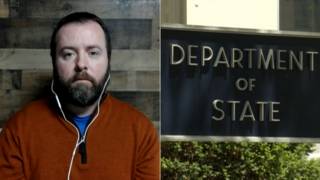
Related
During the GOP primary, Mitt Romney has come under fierce attack for parking millions of dollars of his personal wealth in investment funds set up in the Cayman Islands, a notorious Caribbean tax haven. We speak with Tax Justice Network USA chair Jack Blum, a former top congressional investigator of financial crimes, who says tax evasion could seriously cripple the already struggling economy. Blum appears in “We’re Not Broke,” a documentary that premiered at the Sundance Film Festival. The film examines widespread corporate tax evasion in the United States and the increasing role of offshore tax havens. “Has [Romney] cheated? No,” Blum says. “What he’s done is take full advantage of a system that has been structured the way it is because of political influence and a tremendous amount of lobbying money on Capitol Hill… We must not only rewrite the Internal Revenue Code, but we must get a fair contribution from the very wealthy and from corporations, and that is the only way to balance the budget.” [includes rush transcript]
Transcript
AMY GOODMAN: We’re broadcasting from Park City, Utah, from the Sundance Film Festival. Tonight’s State of the Union address by President Obama comes just as a new Pew survey finds 86 percent of Americans say strengthening the economy should be the top priority of the President and Congress. That was the main subject of last night’s Republican primary debate as Mitt Romney went after his rival Newt Gingrich.
MITT ROMNEY: I think it’s about leadership, and the Speaker was given an opportunity to be the leader of our party in 1994. And at the end of four years, he had to resign in disgrace. Now, in the 1970s, he came to Washington. I went to work in my first job in the 1970s at the bottom level of a consulting firm. In the 1990s, he had to resign in disgrace from this job as speaker. I had the opportunity to go off and run the Olympic Winter Games. In the 15 years after he left the speakership, the Speaker has worked—been working as an influence peddler in Washington.
AMY GOODMAN: Before Mitt Romney lost to Newt Gingrich in Saturday’s South Carolina Republican presidential primary, he came under fierce attack for parking millions of dollars of his personal wealth in investment funds set up in the Cayman Islands, a notorious Caribbean tax haven. Meanwhile, official documents reviewed by ABC News show that Bain Capital, the private equity partnership Romney once ran, set up some 138 secretive offshore funds in the Cayman Islands.
Well, today we’re turning to a former top congressional investigator of financial crimes, who says tax evasion could seriously cripple the already struggling economy. Jack Blum appears in We’re Not Broke, a documentary that has premiered here at the Sundance Film Festival in Utah. The film examines widespread corporate tax evasion in the U.S. and the increasing role of offshore tax havens. Jack Blum is a lawyer and chair of Tax Justice Network USA.
Jack, welcome to Democracy Now! OK, the debate is heating up, primarily between Newt Gingrich now and Mitt Romney. Talk about Mitt Romney and his private equity firm Bain Capital.
JACK BLUM: Bain Capital is a firm that specializes in taking over other companies and supposedly putting them on track to success and then selling the companies off. But this industry is built on tax dodgers of various kinds. So, typically, the money that’s used is borrowed money, and the borrowings are secured by the company that they’re buying. Now, what this does is create tremendous tax deductions for interest payments on the loan. The fascinating thing is that the partnerships that do this are also offshore partnerships. They’re set up in the Cayman Islands.
And they’re set up there for three different reasons. First, tax. There is no tax in the Cayman Islands, and there’s a system of deferral of tax, as long as it’s kept offshore. The second reason for being in the Cayman Islands is no disclosure. You can’t find out who the other partners are. You can’t find out anything about how this partnership is put together. And finally, the third reason is no regulation. So there’s no a Securities and Exchange Commission filing. There’s nothing that will tell us what’s really going on in the partnership.
And finally, if he is one of the partners who’s a manager, he takes his income—this is the income he gets for managing other people’s money—and that comes to him in the form of capital gains, because he’s allowed to have what’s called a carried interest. And the carried interest pays a tax rate of 15 percent. He doesn’t even pay Social Security tax.
Now, what’s unbelievable here is that we have a debate going on in the country about firing teachers, firing firemen, firing public officials, because we’ve got to balance the budget. And that debate is being led by Republicans. And these Republicans are saying, “Got to cut the budget, or else we sink.” Nobody, and this is both Republicans and Democrats, talk about the missing revenue.
AMY GOODMAN: The issue of corporations paying taxes, the Republicans refer to as a job killer.
JACK BLUM: Well, the truth is that the companies that have not paid taxes are the ones who lay people off. So, Bank of America, which made quite a bit of money last year—had a lot of that written off because of loss carryforwards, but still made a lot of money—actually got a refund from the government and, the day its numbers were announced, fired 30,000 people in a restructuring. So, there’s a mythology here that somehow this system of subsidizing companies by giving them either zero or near zero tax rates through these various loopholes is going to create jobs, is so much nonsense. And there’s now an effort underway, and it’s almost comical, to repatriate funds of the companies moved offshore through transfer pricing and other techniques, and they want to repatriate it at a 5 percent tax rate, arguing that that is going to create jobs. Well, we did it before. And in fact, the companies who repatriated funds laid off thousands and thousands of people.
AMY GOODMAN: Talk about Mitt Romney’s tax returns.
JACK BLUM: I haven’t seen them. But what I can say is that he is paying less than average middle-class Americans by far. And he’s doing that because all of his income comes in as capital gains. Now, has he cheated? No. What he’s done is take full advantage of a system that has been structured the way it is because of political influence and a tremendous amount of lobbying money on Capitol Hill.
AMY GOODMAN: Is all of this legal?
JACK BLUM: Yes. And that, of course, is the real underlying problem that we confront. It’s legal, and it is the result of an incredible amount of money being spent on lobbying. There’s a recent study done by Citizens for Tax Justice, who put together numbers that show the companies that have taken advantage of these tax schemes are spending upwards of $2 billion a year in lobbying. That’s how they get the breaks. And it’s this congressional campaign money, it’s the ability to get access to the members, the ability to control and dictate what the tax laws will look like, that gives them the opportunity to engineer those laws, to take full advantage and save huge amounts.
AMY GOODMAN: What do you think has to happen?
JACK BLUM: We’ve got to start taxing corporations. Right now, the average American is being asked to subsidize the corporations, pay a lot of tax, and not get any government services. What creates wealth is the commons. What creates wealth is the infrastructure in America. What creates wealth is our educational system. These corporations, that take full advantage of it, don’t want to help pay for it. And that has to be corrected. But until we get our hands around the problem of campaign contributions, and until the public understands what’s going on, that’s going to be very difficult. And the rhetoric in this campaign, this business of saying the problem is that we’ve got to cut, we have to balance the budget, and not discussing this revenue issue, is nothing short of insane.
AMY GOODMAN: Where is Obama when it comes to leadership on this issue?
JACK BLUM: When he was inaugurated and when he was campaigning, he said he’d straighten up the mess that the tax code is. He didn’t do it. And he’s surrounded by a group of advisers who don’t want to tackle these problems, I think, because many of them come out of the very community and the very law firms that have created the problem. Now, in the film, we show him bringing many of the corporate leaders, who are the heads of companies that don’t pay any tax, in to a circle of people who are advising him on the economy. Well, I can assure you they’re not telling him that the way to solve the economic problems is to collect tax from their companies.
AMY GOODMAN: Doesn’t this also have to do with campaign contributions? He says he’s going—they’re going to raise a billion dollars. That’s the Democrats alone. So the Republicans express the philosophy outright. The Democrats rely on the same amounts of money from the corporations that they fear they won’t get.
JACK BLUM: OK, the congressional Democrats do. I should say, to his credit, Obama has said he won’t take contributions from lobbyists, and corporate contributions are prohibited. However, if you look at the congressional side, that’s a whole different story. But really, the reason for bringing these people in as advisers is, at first, to neutralize their desire to pour money to the other side, but then also to give the appearance of being business-friendly and to make sure that the congressional Democrats continue to get the funding they need to get elected. And when we’re running billion-dollar campaigns on all sides, this is pretty amazing stuff.
AMY GOODMAN: What do you want to hear President Obama say in the State of the Union address?
JACK BLUM: That we must not only rewrite the Internal Revenue Code, but we must get a fair contribution from the very wealthy and from corporations, and that that is the only way to balance the budget.
AMY GOODMAN: Citizens United, how does that fit into this picture?
JACK BLUM: We have an amazing situation as a result of Citizens United. “Corporations are people,” says Mitt Romney in one of his statements. They’re not. Corporations are a special privilege granted to a group of people so that they can invest money without the fear of losing if the investment goes bad. They’re not people. And Citizens United has allowed corporations to get in the act and contribute to these funds, which are, quote, “independent funds,” that spend unlimited amounts of money. And that sort of takes control of the election process. Now, that can’t be allowed. What we have developed is a system of representation that is by money talking and no taxation, which is absolutely the reverse of where this republic started.
AMY GOODMAN: How do you talk about tax justice? How do you change the conversation in this country? You’re featured in a film here at the Sundance Film Festival called We’re Not Broke. That’s going to surprise a lot of people.
JACK BLUM: Well, of course, because there’s been this drumbeat of “We’re broke. We’re broke. We’re broke. Fire everybody.” The way we’re going to change that is to show people what’s going on. When people saw this film, when people began to understand that corporations like Google and Apple don’t pay U.S. federal tax, their jaws dropped. Now, how you can solve these budget problems and not talk about that is unfathomable. And we’re going to get them talking about it by looking at those tax returns and looking at what’s really going on.
And this film shows not only the question of how that money has not been paid, but it also shows young people all over the country spontaneously beginning to understand the issue and demonstrating. So, a group called US Uncut stepped forward and began to demonstrate in front of some of these companies, saying, “Pay your fair share of taxes.” And that morphed into some of the folks who are in the Occupy movement. So I think there are groups—there are many groups that are involved now in trying to bring this message across. Tax Justice Network has worked with a coalition called the FACT Coalition. It’s more than 40 different non-profit groups—some conservative, some liberal, some religious, some labor. And they’re all talking about the issue of, we have got to get back to a point where there’s tax collected and where government services are provided based on taxes being collected.
AMY GOODMAN: Jack Blum, I want to thank you very much for being with us, former top congressional investigator of financial crimes, lawyer and chair of Tax Justice Network USA.
This is Democracy Now!, democracynow.org, The War and Peace Report. Two State of the Union addresses ago, President Obama promised a nuclear renaissance. We’ll look at The Atomic States of America. Stay with us.












Media Options